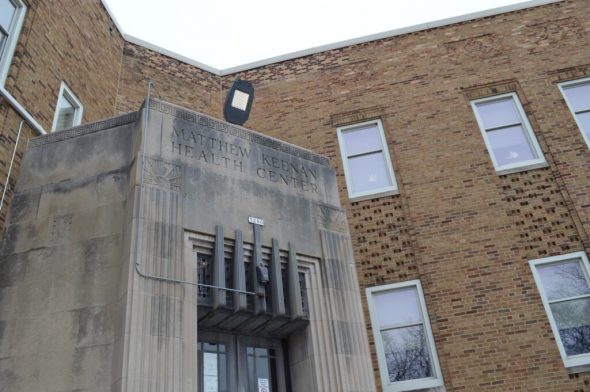City Sees Surge in Syphilis Cases
Number for 2021 higher than combined total for 2016 through 2019.

The Keenan Health Center is one of the health department’s main locations for treatment as the city battles a syphilis outbreak. NNS File photo by Ana Martinez-Ortiz
Milwaukee saw at least 255 cases of syphilis in 2021, more than the totals from 2016 to 2019 combined, according to a report by the Milwaukee Health Department.
The data comes from a September report, and the final total for syphilis cases in Milwaukee has not been released.
Syphilis is a sexually transmitted infection. Cases of primary syphilis – noted by a sore or sores at the original site of infection, possibly the genitals, mouth and rectum – and secondary syphilis, which can be found because of skin rash, fever or swollen lymph nodes, are the most common.
The Milwaukee Health Department reported six cases of congenital syphilis, or babies born with syphilis, in 2021. Milwaukee had five cases of congenital syphilis in 2020. In an average year, one case is considered significant.
Public health consultant Melissa Ugland said the city’s jump in cases, especially in congenital syphilis, is cause for concern. She said that congenital syphilis cases are considered to be “sentinel events” in health care, meaning an unexpected case that can cause death or permanent physical or psychological harm.
“We need people to treat this with the seriousness it requires, pandemic or no pandemic,” Ugland said.
Pandemic create challenges
Although the cause for the spike is unclear, Dr. Heather Paradis, chief medical officer of the Milwaukee Health Department, said the recent surge was worsened by COVID-19. She said people faced financial challenges or were hesitant to go to a medical office during the pandemic. Some also lacked access to health care.
For instance, she said, the pandemic has caused more people to trade sex for shelter, food and other basic needs, putting them at higher risk of contracting syphilis. In other cases, clinics were not as accessible because COVID-19 curtailed hours of operation and in-person visits.
The jump in cases highlights the need to increase testing, Paradis said.
“Usually what we find in syphilis increases is that there are lots of little things that end up causing a much larger problem. said Brandon Kufalk, sexually transmitted infection unit supervisor with the state Department of Health Services.
Kufalk said the Milwaukee Health Department has been receiving recommendations from the state on how to stop the spread of syphilis. The state also has provided three disease intervention specialists to the department to provide support, he said.
Paradis said the Milwaukee Health Department has released guidelines for health care providers to address syphilis and is partnering with the Department of Health Services for outreach and messaging in the areas hit hardest by syphilis.
According to a report from the Milwaukee Health Department, roughly 66% of the city’s syphilis cases were among Black residents from 2018 to 2020. This is compared to about 15% in both the white and Latinx populations.
Carter said the department employs seven disease intervention specialists and two coordinators. The department has the budget to hire one more intervention specialist but is fully staffed, she said.
A disease intervention specialist will reach out to a patient to provide education, arrange treatment and conduct contact tracing for any sexual partners the person had. Kufalk said in some cases, disease intervention specialists will pick up and drive patients to treatment centers.
Efforts to address the disease are occurring outside the department as well, as community partners offer testing and treatment services.
“If we had the staff capacity, I think there would be room for process improvement and then we would potentially conduct audits and follow up,” Carter said. “But the state is really good at reviewing cases as well. If there’s any red flags or concerns, we have a second set of eyes.”
Where to get tested in Milwaukee
Free or low-cost testing is available at local health centers, such as Sixteenth Street Community Health Centers and Milwaukee Health Services.
The Milwaukee Health Department maintains a list of places to get tested in the area.
To contact the Milwaukee Health Department’s Keenan Health Center, call 414-286-8840. It is located at 3200 N. 36th St.
BESTD Clinic, 1240 E. Brady St., offers syphilis testing. Call 414-272-2144.
Holton Street Clinic, 3521 N. Holton St., provides free syphilis and HIV screening. Call 414-264-8800.
To contact Planned Parenthood and make an appointment, call 844-493-1052 or visit its website and select “Book Online.” Planned Parenthood has multiple locations throughout the city. You can find health centers near you at this link.
Milwaukee sees rise in syphilis cases was originally published by Milwaukee Neighborhood News Service.






















unfortunately neither of the city reports on the crisis contain action strategies to slow the transmission, nor do they contain any mention of what past actions & strategies from the MHD were successful & they will re-initiate quickly, nor do they contain any references to any actions or strategies that were successful in other cities.
The reason for tracking all this data is to guide strategies that effectively address (or solve) the problem, and journalists could do a much better service to readers by asking better questions instead of allowing officials to simply read their canned talking points memo.